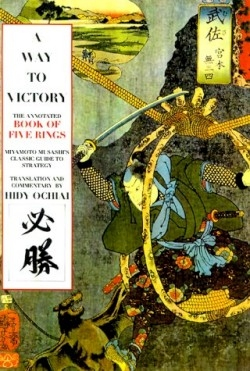The Way to Victory
The Annotated Book of Five Rings Miyamoto Musachi
Vince Lombardi, the legendary former coach of the Green Bay Packers, once said that winning wasn’t everything, it was the only thing. He may well have been borrowing from the famous Japanese treatise on combat and strategy written three centuries earlier. Musachi’s strategy as a samurai warrior is “based on absolute victory whenever one is engaged in combat.”
Beginning his career at the age of thirteen by slaying his first opponent, Musachi went on to defeat over sixty other samurais by the age of thirty. He then turned inward for twenty years to reflect on the martial strategy and techniques that would ensure those who followed his teachings success in everything from deadly combat to corporate skirmishes along New York’s Wall Street. Book of Five Rings is the culmination of his life’s accomplishments and introspective analysis.
To Musachi, one’s determination, based on self-discipline and willpower, is of utmost importance to the accomplishment of any task in any field. His “way” of the warrior includes methods to “outpsych” one’s opponent, in addition to besting him physically. “No matter what one practices, he must always try to be superior to others.” To Musachi, that means never fighting with someone of superior strength. The idea is to find an opponent whom you are sure to defeat. The trick, perhaps, is in determining just who those opponents are.
Ochiai is superbly suited to provide the translation and commentary to this renowned treatise on strategy and combat written over three hundred years ago. He is one of the premier martial arts masters in the world and has been inducted twice into the Black Belt Hall of Fame. He has written two other books, The Complete Book of Self-defense and Hidy Ochiai’s Self-defense for Kids. Without his contemporary insight into the classic text, much of the old samurai’s wisdom and the treatise’s application to today’s world could easily be lost on the reader.
The book should appeal to both the martial arts enthusiast and the “boardroom brawler.” It is impossible to read Musachi’s words without applying them to the reader’s own employment, family, or social situation.
Reviewed by
Alan J. Couture
Disclosure: This article is not an endorsement, but a review. The publisher of this book provided free copies of the book to have their book reviewed by a professional reviewer. No fee was paid by the publisher for this review. Foreword Reviews only recommends books that we love. Foreword Magazine, Inc. is disclosing this in accordance with the Federal Trade Commission’s 16 CFR, Part 255.

